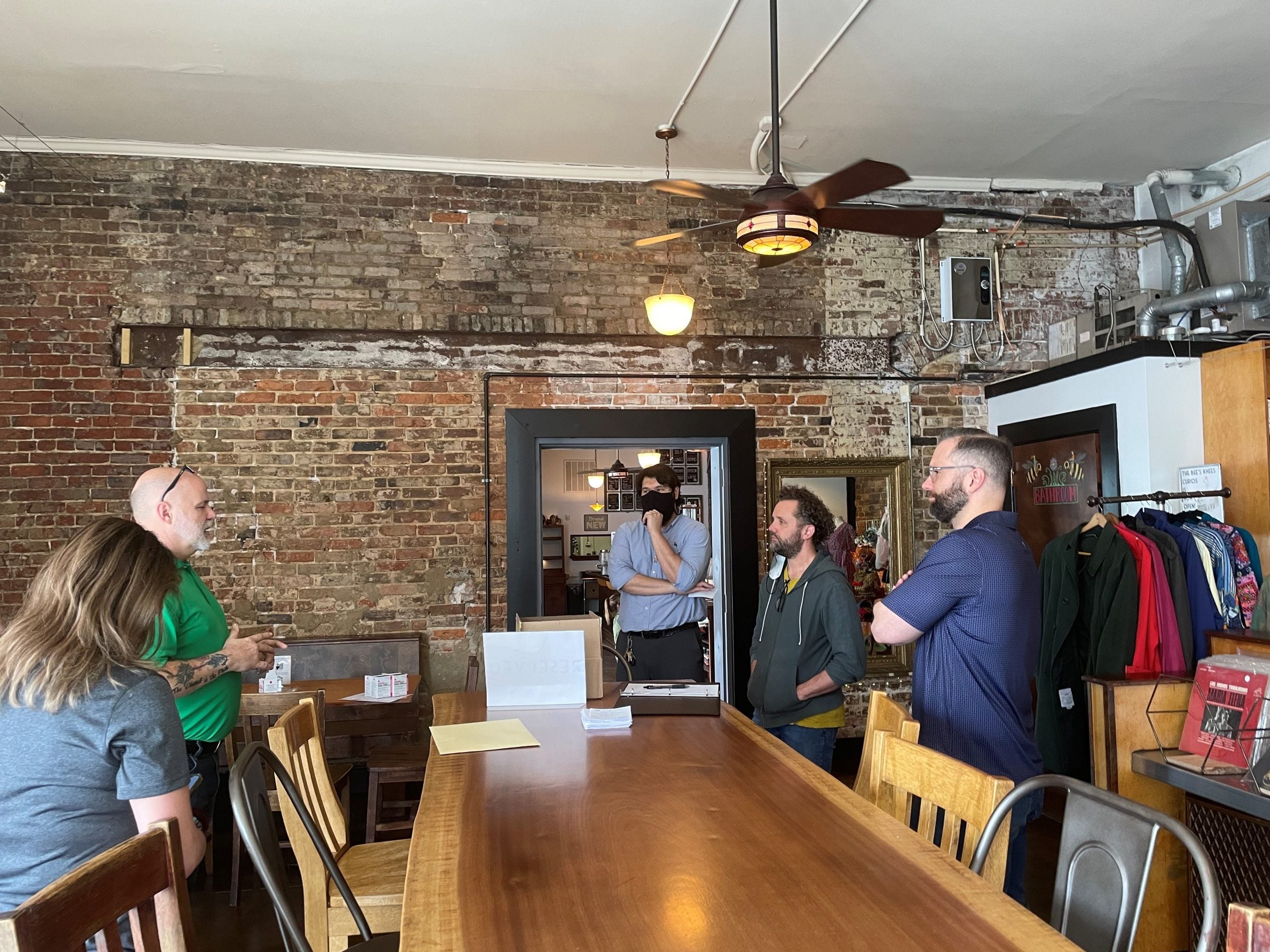Tinges of blue around a person’s mouth or the sounds of gurgling are two possible signs of an opioid overdose. Although symptoms can vary from person to person, these are a few conventional things people learned to look for in a seminar Wednesday.
“That’s the body shutting down,” said Christian Frazier, executive director of Focus on Recovery – Augusta. “It’s desperately trying to get breath.”
Focus on Recovery – Augusta is eager to educate local businesses, and anyone else who wants to learn, regarding the truth about addiction, laws surrounding it and what everyone can do to help save lives.
“I think an educated community is a more empathetic community,” said Frazier. “We just want to change what people understand about addiction and recovery.”
Through the organizing efforts of Molly Swift, owner of Fine Roots Marketing consulting agency, the local nonprofit held a harm reduction session at The Bee’s Knees café on Wednesday. The question-and-answer and training session was open to the public, offering information to anyone who stopped by to receive it.
[adrotate banner=”51″]
Participants could learn about the physical signs of opioid overdose as well as how to administer Naloxone, also known as Narcan, medicine that rapidly reverses the effects of overdosing on opioids, such as heroin or fentanyl. Focus on Recovery also distributed free Narcan, in nasal applicators that anyone can use, in packages of two doses.
“I do trainings all the time with individuals, sometimes with businesses,” said Dolly McCurry, harm reduction specialist with Focus on Recovery – Augusta. “It’s definitely something that we want to make more businesses aware of, that we do this and we offer this, especially if they are dealing with certain populations that are more at risk of overdose.”
Frazier explained many other symptoms of an overdose including a common indicator – the appearance of drowsiness, known among some users as “nodding,” as well as unconsciousness, which is especially dangerous in those still using opioids and necessitates a first aid response.
Frazier and McCurry both stress how calling 911 is essential in any attempt to respond to a possible opioid overdose, even though Narcan is effective for reversing the effects within minutes. The medicine works by blocking opioid receptors in the brain, but it’s possible that an overdosing individual has so much of an opioid in his or her system that the usual Narcan dosage might not sustain.
“Always, always call 911 first, because sometimes two doses is not enough to bring someone back,” said Jordan Lewis, chairman of Savannah River ROC, a non-profit recovery and support community based in North Augusta that frequently partners with Focus on Recovery. “They could go back under, depending on how much they used.”
[adrotate banner=”15″]
Because of this, Focus on Recovery also emphasizes the benefit of the Georgia 9-1-1 Amnesty Law, passed in 2014, which assures that no one who seeks or receives emergency assistance for a drug overdose or alcohol poisoning will be arrested for possession or any drug charge.
“Before this medical amnesty law, we really had a problem with people being abandoned,” said Frazier. “Somebody would overdose and they would just take them and put them in the park, or take them and drop them off at the ER and then speed away, and they would die wherever they were left, because they weren’t getting the attention they deserved and their friends were worried that when first responders came on that they would be taken to jail.”
Focus on Recovery – Augusta received their Narcan supply for the harm reduction session from the Georgia Overdose Prevention Project. Frazier encourages people to not only include Narcan in their home and business first-aid kits, but also to alert organizations like Focus on Recovery when the information they’ve given has actually helped prevent fatalities.
“We saved over 130 lives, that we know about, from passing these kits out and getting that feedback from the community,” said Frazier. “We’re always telling people to let us know. That’s the kind of information you have to turn in to keep receiving these things and passing them out for free.”
Both Focus on Recovery and Savannah River ROC are determined to continue their education efforts when and wherever they’re asked, largely as part of an overall attempt to raise awareness as a means of changing the wider culture. Frazier, who himself is in recovery, notes his own experience.
“I was arrested multiple times,” said Frazier, who himself is in recovery. “I should not be allowed, by definition of how our society typically views addiction, to do what I do today. I overcame it, and that’s because I was met with compassion, empathy, a life-changing voice. If that worked for me, I know it can work for more people, but I need more people to be empathetic and understanding in order for that to happen.”
For more information about Focus on Recovery – Augusta, its free harm reduction training, Narcan and similar topics, visit its website at www.foraugusta.com. For more information about Savannah River ROC, visit its Facebook page at https://www.srrocrecovery.org/.
Skyler Q. Andrews is a staff reporter covering education in Columbia County and business-related topics for The Augusta Press. Reach him at skyler@theaugustapress.com.











